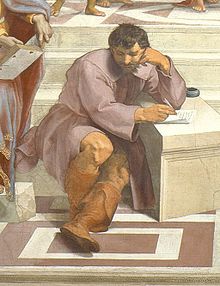- On Nature (Heraclitus)
-
- For other philosophical literature of the same name see On Nature
 Heraclitus (figured by Michelangelo) sits apart from the other philosophers in Raphael's School of Athens
Heraclitus (figured by Michelangelo) sits apart from the other philosophers in Raphael's School of Athens
On Nature is a philosophical treatise written by Heraclitus. According to Diogenes, it was divided into three discourses; one on the universe, another on politics, and one on theology. Theophrastus says (in Diogenes) "... some parts of his work are half-finished, while other parts make a strange medley."[1]
Diogenes also tells us that Heraclitus deposited his book as a dedication in the great temple of Artemis, the Artemisium, one of the largest temples of the 6th century BCE and one of the Seven Wonders of the Ancient World. Ancient temples were regularly used for storing treasures, and were open to private individuals under exceptional circumstances; furthermore, many subsequent philosophers in this period refer to the work. Says Kahn:[2] "Down to the time of Plutarch and Clement, if not later, the little book of Heraclitus was available in its original form to any reader who chose to seek it out." Diogenes says:[3] "the book acquired such fame that it produced partisans of his philosophy who were called Heracliteans."
As with other pre-Socratics, his writings only survive in fragments quoted by other authors.
Categories:- Ancient philosophical literature
- Heraclitus
- Metaphysics literature
- Presocratic philosophy
Wikimedia Foundation. 2010.
